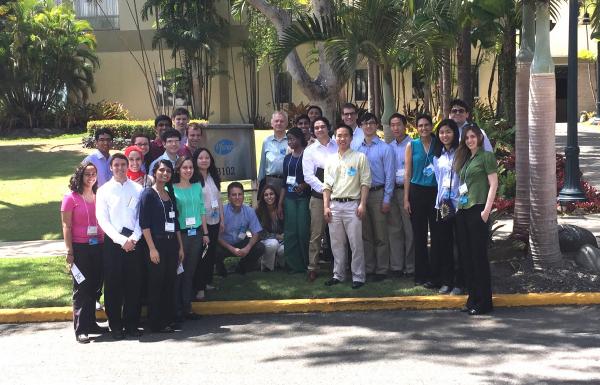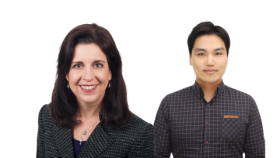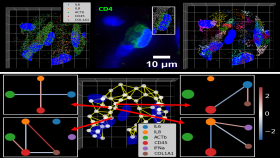There is a rotating group of students at the Georgia Institute of Technology for whom spring break always means traveling to a place where beautiful beaches and warmer climates are the norm. But these students rarely come back to campus with much of a tan, because that isn’t really part of the agenda on the annual Pharmaceutical Education Industry Plant Trip to Puerto Rico, which is all about exposure, but not exposure to the sun.
“This trip offers a unique way to introduce students to a number of different, important experiences,” says Mark Prausnitz, director of the Center for Drug Design, Development and Delivery (CD4) at the Petit Institute for Bioengineering and Bioscience. “But mostly, it provides them with an up-close look at state-of-the-art pharmaceutical manufacturing processes in action that they have learned about in the classroom.”
Prausnitz and CD4 Associate Director Andreas Bommarius, both professors in the School of Chemical and Biomolecular Engineering, led last month’s Puerto Rico field trip, part of a class they teach called Drug Design, Development and Delivery (D4). From the start, the class was designed to be interdisciplinary, bringing in students from the Wallace H. Coulter Department of Biomedical Engineering (BME), the School of Chemical and Biomolecular Engineering, and the School of Chemistry and Biochemistry.
The Puerto Rico trip that Prausnitz and Bommarius have organized for the past eight years has become an important rite of spring for students interested in learning more about the pharmaceutical industry. The five-day trip also is the reason that Prausnitz and Bommarius were named winners of the 2015 Innovation in Co-Curricular Education Award from the Georgia Tech Center for the Enhancement of Teaching and Learning, which recognizes faculty who increase student learning outside the traditional setting.
Students who choose to go on the trip (travel contingent is limited to about 25) get a rare and comprehensive look at Puerto Rico’s burgeoning biotech industry, which features some of the world’s top drug and device manufacturing facilities and companies, such as AbbVie, Amgen, Medtronic and Merck.
“Students get to interact with the industry professionals who operate and, in some cases, developed these manufacturing processes, thereby gaining a deeper understating of the profession,” Prausnitz says. “And they get to have these experiences in the context of the rich Puerto Rican culture, which provides additional new experiences.”
For some students, like Monica Perez Cuevas, it’s an opportunity to learn a little more about their own backyard.
“The trip had an added benefit for me, because I’m actually from Puerto Rico,” says Perez Cuevas, a first-year graduate student in the School of Chemical and Biomolecular Engineering. “It’s a great advantage getting to see, first hand, how things work in the pharmaceutical industry. It gives you great perspective on what biomedical research is about, and we really did have first-hand exposure.”
She adds, “I mean, here’s a machine right in front of your face, and here are the experts telling us how it works, why it was built this way – all of the technical aspects we discussed in class, right there in front of us. This is the kind of experience that will help me make an informed decision later on when I consider my career options.”
Thomas Ng, a third-year BME undergraduate student, says that deep dive into the manufacturing process is, “an eye-opening experience, because you’re seeing the process from start to finish.”
For Angel Cobos, a recent graduate in the School of Chemistry and Biochemistry, the opportunity to speak with industry professionals was key, and he found the panel discussion with human resources people at Amgen especially interesting.
“These are executives and experts who basically told us how to get our foot in the door,” says Cobos, who has a job lined up at the Centers for Disease Control and Prevention, but says he’s also interested in pursuing a Ph.D. down the road and is considering a career in academia. “They sat us down and gave us an overview of what they did and how they got where they are in their careers. These were people who are really successful in this industry, and they were willing to answer all of our questions. You don’t typically get that kind of access.”
According to Ng, the spring trip was mostly, “work, work, work, on the bus by 7:30 in the morning, and by the time you’re done touring facilities, get back at 7, get dinner around 8, you’re tired. Some us managed to do some fun stuff, though.”
Some of the fun stuff – that is, the non-biotech study, study, study stuff – has become part of the annual spring tradition, such as trips to Old San Juan, the bioluminescent bay in Fajardo, and a tour of the Bacardi Rum Distillery. But the group’s first stop on the trip, the first day they arrived, was the Arecibo Observatory, home of the world’s largest single-dish radio telescope, and it never fails to leave an impression.
“It’s in the middle of nowhere, this huge crater, a thousand-foot wide dish collecting radio signals from outer space,” says Cobos. “We packed in as much as we could for five days, but this was an absolutely stunning way to start the trip.”
CONTACT:
Jerry Grillo
Communications Officer II
Parker H. Petit Institute for
Bioengineering and Bioscience
Media Contact
Jerry Grillo
Communications Officer II
Parker H. Petit Institute for
Bioengineering and Bioscience
Keywords
Latest BME News
Commercialization program in Coulter BME announces project teams who will receive support to get their research to market.
Courses in the Wallace H. Coulter Department of Biomedical Engineering are being reformatted to incorporate AI and machine learning so students are prepared for a data-driven biotech sector.
Influenced by her mother's journey in engineering, Sriya Surapaneni hopes to inspire other young women in the field.
Coulter BME Professor Earns Tenure, Eyes Future of Innovation in Health and Medicine
The grant will fund the development of cutting-edge technology that could detect colorectal cancer through a simple breath test
The surgical support device landed Coulter BME its 4th consecutive win for the College of Engineering competition.
New research from Georgia Tech helps doctors predict how therapies will interact with a child's immune system, potentially improving outcomes and reducing risks.








